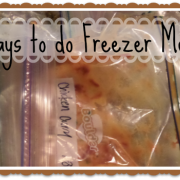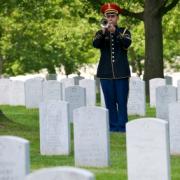"So Jocelyn," the television host boomed as she held a microphone under my chin at the International Christian Retail Show. It was my first TV appearance after the release of Wedded to War, and I was prepared to talk about the Civil War, nursing, the writing process, or almost any related topic. Instead, "I hear you do freezer meals, is that right?"
Slight hesitation. "Yes, that's right."
"Tell us about that!"
The topic struck me as an odd one for the occasion, but I complied, much to my agent's amusement afterward. :) Since then, I've noticed a lot of fascination with freezer meals. Most people agree it sounds like a good idea--it saves you oodles of time, money, and sanity--but they stop short of doing it themselves because the task sounds so daunting. But listen. You can do it. Anyone can. Here are three different approaches to consider.
1. Easy Does It
This is a great way for anyone to build up their freezer meals, but especially those who can't carve out a full day for meal preparations. When you make your own family dinner, double it. Eat one the day you prepare it, and freeze the other. Casseroles, etc., will save for about three months in the freezer. If it's just marinated meat, it can keep for up to six months. Use gallon size ziplock freezer bags, or tin or Gladware 8x8 dishes covered with tin foil. (I actually cover mine with three layers and then put it in a gallon ziplock.) I also do this with cookie dough. We'll bake half the batch, then I'll divide and freeze the rest of the dough to bake later. Label everything with date and cooking instructions. You may know exactly what to do, but if you give the meal to a new mom or someone recovering from surgery or broken limb, instructions will be handy.
2. Sweet and Simple
Option number two: Join forces with nine or so other friends/acquaintances. Each of you commit to making a dinner entree times ten on your own time, in your own kitchens. Set a time and place and swap meals, so each of you end up with ten different meals for your freezer. Just determine who is making what ahead of time so there is a good variety.
3. Go the Distance
It's time to roll up your sleeves! Find a friend or two and spend one full day prepping about 30 meals for each of you. This is the option I choose before I head into my writing cave for major projects. In fact, I just did this with my neighbor last Friday (time to start drafting Spy of Richmond!) so I have several tips still fresh in my mind to share.
[[{"type":"media", "view_mode":"media_large", "fid":"997", "attributes":{"class":"media-image aligncenter", "typeof":"foaf:Image", "style":"", "width":"419", "height":"489", "alt":"SAMSUNG CAMERA PICTURES"}}]]
Planning
First, it makes sense to work with a friend whose family size is similar to yours.
Choose a host kitchen for meal prep day. Counter space is king. Also, proximity to a grocery store may be a consideration--you just might find a grocery run necessary.
Together, decide whether you want to prepare fewer meals in greater quantities (i.e. four batches of fifteen meals, so you each get two of the same) or more meals in fewer quantities (i.e. two batches of thirty meals). Preparing more of the same kind of meal simplifies the grocery shopping, but some find the extra effort worth it to have greater variety in the freezer.
Choose your recipes. You can use your own, or consult special cookbooks such as Don't Panic, Dinner's In the Freezer, or browse any number of freezer meal recipes online. Check out these links or search Pinterest if you want more ideas. Just be sure to include a variety in your plan.
You can shorten your meal prep day by choosing recipes that require fewer ingredients, and those that do not require you to pre-cook meat.
Make your grocery list carefully. Indicate ounces next to jars and cans.
When shopping, note that a 28-ounce can is not always cheaper than buying two 14-ounce cans. Be prepared to do lots of calculating in the aisles.
To save money, consider substituting ground turkey for ground beef for some recipes, or go to a meat locker if you can.
Buying a whole chicken is much cheaper than buying skinless boneless chicken breasts, but keep in mind it will take longer to get the meat off the bird.
Wait as long as you can to do the shopping since you'll need most of your fridge/counter space for the groceries until the meal prep day.
Save time on meal prep day by labeling your ziplock bags beforehand. Writing the date, meal, and cooking instructions on 60 bags (or 40, or 80, or whatever you decide) gets tedious.
Consider making cookies or cookie dough to trade on meal prep day, too. I did this with a friend in November, and it was a big help to have Christmas cookies already done for the season!
If you have kids, arrange for their care ahead of time, at least for part of the meal prep day. Or if they are old enough, put them on clean-up duty--washing dishes, rinsing cans and peeling off labels if you recycle, etc.
Last week I took a Sharpie and labeled the top of every can I bought, which meant I didn't have to pick up each can to find what I was looking for a meal prep day. Also, if a little one comes along and takes all the labels off any cans when you're not looking, all is not lost. :)
Decide what you'll eat on meal prep day for lunch and dinner. It has worked well for me to pack a sandwich for lunch (or have hubby bring us take-out), and have pizza for dinner, or just easy-to-eat things like string cheese, bananas, etc. DO NOT WASTE TIME making or cleaning up after your own lunch and dinner on meal prep day!
If you are not the hostess, bring a laundry basket or two with you to help carry the meals home.
Meal Prep Day
Start as early as possible. Expect to work past dinner time. If you get done earlier, so much the better.
Wear good shoes. You'll be standing all day.
Use a food processor to chop, slice, shred. If you don't own one, but plan to do a lot of vegetable chopping, borrow or buy one. I have a 7-cup one and it works great.
Wearing an apron protects your clothes but also gives you an instant towel for your hands.
Bring an extra can opener.
To cut down on eye-sting from onions the best solution I've used is to set up a standing fan to blow the vapors away. You could also wear a ski mask, which is what I did last week. Sorry, no photos. :)
Choose a system for tackling your recipes. Once my friends and I each took a recipe to do all the way through. Last week my neighbor and I worked at stations until it was time to assemble. I was the Queen of the Food Processor and she was the Meat Maestro. (I definitely got the easier end of the deal.) Once those jobs were done, I added the cans to the bags, and she added the spices.
Save time by not peeling your washed carrots before you chop them. No one will know.
Consider putting your crock pots to work for you while you work. Last fall my friend and I had a roast cooking in each of our two crockpots. At the end of the day we shredded the meat and added sauce to make BBQ pulled pork. YUM.
Wherever you're working, have a "garbage bowl" nearby so you're not frequently making trips to the kitchen trash can.
Have plenty of rags or paper towels on hand. Spills happen.
Have a few first aid items ready, such as band-aids and whatever burn ointment you prefer.
Keep a sense of humor.
Ask questions of each other to clarify who's doing what, what's been done, etc.
If you have extra vegetables, chop them up and put them in a freezer bag to steam later as a side dish.
If you are short on an ingredient, ask yourself: can I go without it? Does the hostess have it in her pantry? Can we substitute something else in its place? Can we add it to the recipe on the day we cook it? If the answer to all these questions is no, send a husband to the grocery store. :)
Expect to smell like onions and peppers for at least a day after this.
If you trust the seals on your freezer bags, lay them flat in your freezer and stack them. It saves space AND thawing time.
Save out at least one meal for your family to eat the next day. I'm telling you, you will not feel like cooking quite yet!
This "go the distance" brand of freezer meals does take Rocky Balboa-style stamina for one day, but it's so worth it. I now have 30 meals in my freezer, which means I have way more mental space for writing every day, or for playing Chutes and Ladders with my son at 4:30 in the afternoon. Also, the cost ended up being an average of $1.15 per serving, which is GREAT! Final tip: when you feel your energy lagging on meal prep day, pull up this blog post and play the following YouTube clip. You can do it!




